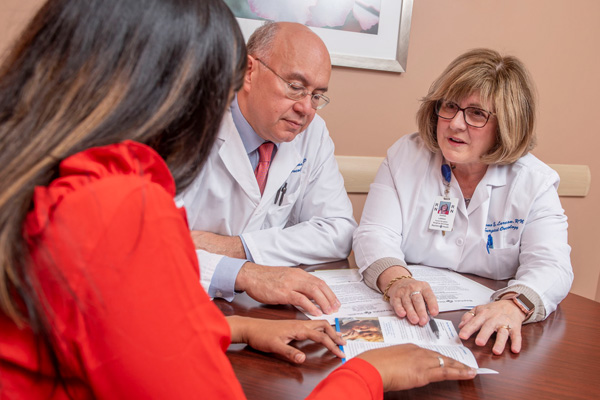
Quick Links
The Baystate Regional Cancer Program
We provide the advanced cancer diagnosis, treatment, and care you need – close to home. Through the Baystate Regional Cancer Program, you have access to:
- A multidisciplinary team of the region’s most extensive and accomplished cancer specialists
- The highest caliber treatments including chemotherapy, radiation therapy, and surgery, backed by experience and research
- Personalized, compassionate treatment focused on your unique situation
- Expert cancer care and cancer treatments for children at Baystate Children's Hospital
- State-of-the-art breast cancer screening and diagnostic technology
Care for Every Step of Your Cancer Journey
You’ll not only be treated by compassionate cancer experts in state-of-the-art facilities using the latest technology, but you'll benefit from comprehensive cancer support services designed to help you meet the challenges that can come with a cancer diagnosis.
When you come here, you’re not just getting a doctor, you’re getting an entire care team dedicated to your needs, with the compassion to address your concerns and the expertise to put your mind at ease. We deliver expert cancer care right in your community, where you can remain surrounded by familiar comforts and the support of family and friends.
Related Conditions, Treatments, and Diagnostics

The Latest in Cancer Care

Our Clinical Trials
Routine Colon Cancer Screening Saved Lisa Marie's Life

Lisa Marie Berthel remembers the phone conversation clearly. She had gotten a routine colonoscopy and within a couple of days, she got a call from the doctor. “I’m sorry to tell you, he gently, “but it’s cancer.”
Related Health Articles
-
Healthy Aging
![two menopause-aged women walking in nature]()
Navigating Menopause: Signs, Stages, and Symptom Relief
-
Wellness & Prevention
![Over-the-Counter Birth Control Pills-What You Need to Know]()
Over-the-Counter Birth Control Pills: What You Need to Know
-
Wellness & Prevention
![What Are Fibroids_ Treatments and Options for This Common Issue]()
What Are Fibroids? Treatments and Options for This Common Issue
-
Wellness & Prevention
![A woman on a yoga mat performing a bridge pose]()
What are Kegels? Learn How Kegel Exercises Help with Incontinence
-
Wellness & Prevention
![Expert Breastfeeding Tips]()
7 Breastfeeding Tips for New Moms from a Lactation Expert
-
Wellness & Prevention
![Stress Incontinence-What You Need to Know About a Leaky Bladder]()
Stress Incontinence: What You Need to Know About a Leaky Bladder
-
Birth Planning
![Black Maternal Health Disparities]()
Black Maternal Health Disparities - How Baystate Health is Working to Improve Equity
-
![Birthing parent holding newborn who rests on chest]()
Pelvic Floor Pain - How to Get Help with Postpartum Pelvic Floor Dysfunction
-
Wellness & Prevention
![Who should get the HPV vaccine]()
The HPV Vaccine: Does it Benefit People My Age?
-
Birth Planning
![What is Water Birth_ Pros and Cons]()
Curious About Water Birth? A Midwife Discusses Birthing Options
Back to Top












